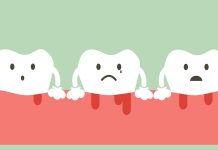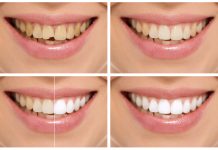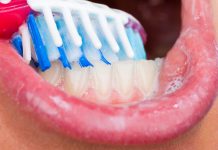Daily habits that might seem like no big deal add up over the years, setting you up for bad breath, gum recession, and sensitive teeth in the long run—but don’t worry, many of these are reversible or involve a simple change in your oral care routine!
Even if you think you’re doing everything right, there may be dental mistakes you’re making everyday that you’ve never considered. Daily habits that might seem like no big deal add up over the years, setting you up for bad breath, gum recession, and sensitive teeth in the long run—but don’t worry, many of these are reversible or involve a simple change in your oral care routine!
Here are the top five mistakes I see all the time, along with how to fix them so you can be well on your way to better dental health.
1. Using Mouthwash
Despite what a lot of advertising would have you believe, mouthwash actually isn’t all that great for your dental hygiene. It disturbs the natural flora in your mouth and can even be drying, thus promoting the growth of the very bacteria you’re trying to kill! In fact, you want to nourish and promote a healthy balance of bacteria in the mouth for great breath, cavity prevention, and even overall health.
Ever heard of taking probiotics for gut health? The same principle applies for your mouth. If you’ve been using mouthwash for a long time or have taken antibiotics at any point in your life (that’s most of us!) you can help restore this balance by including probiotic-rich foods in your diet like sauerkraut and cheese and taking a probiotic supplement. I take this one daily, which is designed specifically for dental health—it’s chewable and mint-flavored, but I actually suck on it like a lozenge to maximize the benefits.
If you can’t give up that fresh feeling you get when you’ve swished with mouthwash, though, the least you can do is switch to something natural: you’ll want a mouthwash without any alcohol and also devoid of all of the chemical junk you’ll find in conventional mouthwashes. For our top picks, check out our guide to natural mouthwashes (you’ll even find an option to make your own from all-natural ingredients).
2. Brushing Too Hard
Harder isn’t better when it comes to brushing. In fact, if you brush your teeth too hard, you could be causing damage to your mouth, specifically, your gums.
When you brush your teeth too hard, your gums will begin to recede up and away from your teeth. This leaves sensitive parts of the tooth exposed, and it can also make you more susceptible to gum infections.
This problem is compounded when you’re brushing too hard with an old toothbrush. When nylon toothbrush bristles are first made, they are rounded into little domes to make them less abrasive to your teeth, but as they wear away with use, they become sharper, like little knives. This can cause damage to tooth structure and enamel, literally wearing your teeth away and making them susceptible to damage and cavities. I recommend replacing your toothbrush every four weeks if you’re brushing twice a day (which is far sooner than the indicator strip on your toothbrush would have you believe, by the way).
Consider setting a reminder in your calendar to remind you to replace your toothbrush, or subscribe to a service like Quip or Goby, which will send you new toothbrush heads in the mail at an interval you set, so you never have to remember when it’s time.
All of these problems are even further compounded if you’re also brushing too hard. Brushing too hard not only contributes to tooth enamel being stripped away, it also doesn’t clean teeth effectively. When you brush hard, you usually have less control over where your brush is going, meaning you’ll clean the outside of each tooth quickly, but you won’t get into the spaces between teeth.
Find out more about the proper gentle brushing technique with my guide to how to brush your teeth correctly.
3. Ignoring Pain
Mouth pain is a sign that something’s wrong in your mouth, and that should never be ignored. While some pain can be easily soothed at home with oil pulling or painkillers, most mouth pain requires a visit to your dentist.
Some pain can be caused by an infection or abscess, which can be quite serious if not treated. Other tooth pain can come from grinding or clenching your teeth, which should prompt your dentist to screen you for sleep apnea or another sleep breathing disorder.
Other pain, such as increased sensitivity to food temperatures, pressure sensitivity, or general dull aches in your teeth and jaw can mean that your teeth themselves have been damaged, and to fix this, you’ll definitely need the help of a dentist.
The reason not to wait and see is simple: once damage is done to a tooth, it never gets better. Yes, teeth do heal themselves, but pain is an indicator that you’re past the point of the tooth healing itself, and waiting only leads to further damage. The sooner you make an appointment, the smaller the problem will be (and the easier it will be to fix).
4. Brushing at the Wrong Times
You were always told to brush after every meal, right? Well the truth is a bit more complicated than that.
While certain foods and drinks—especially ones high in refined carbohydrates—spur the growth of bacteria in your mouth in as little as 20 minutes, requiring immediate brushing afterwards, if you brush after other foods, especially acidic ones, you might be doing more damage than good.
Brushing your teeth immediately after consuming acidic foods can damage tooth enamel. Acidic foods weaken tooth enamel for about 30 minutes after eating, so brushing up to 30 minutes after meals will actually strip away the enamel in its weakened state, leading to an increased susceptibility to cavities.
This is why I like to say it’s better to brush and floss before breakfast, rather than after!
Instead of brushing after eating acidic foods, swish with water or chew gum (I recommend this one, which is aspartame-free and contains remineralizing xylitol) to neutralize acid in the mouth. Once 30 minutes have passed, you’re free to brush.
And as for the debate over whether to brush or floss first, it isn’t actually all that important. While there’s a case for both side, what matters is that you’re doing both.
5. Being Afraid of the Dentist!
Have you ever been scolded or felt humiliated at the dentist? Unfortunately, it’s common to not only fear the pain and discomfort of going to the dentist, but also the shame—and this is simply unacceptable. Going to the dentist shouldn’t be painful or anxiety-inducing at all…if you’ve chosen the right practitioner, that is.
Finding a shame-free dentist is one of the best investments you can make not just in your dental health, but your overall health as well, since dental health impacts virtually every other system in the body. The right dentist will take the time to explain every procedure, put you in the driver’s seat, and will put you at ease. There should be zero tolerance for dentists who make insensitive remarks or shame their patients. The right dentist should make you feel good, not ashamed!
Source: <a href=”https://askthedentist.com” target=”_blank” rel=”noopener noreferrer”>AskTheDentist</a>







